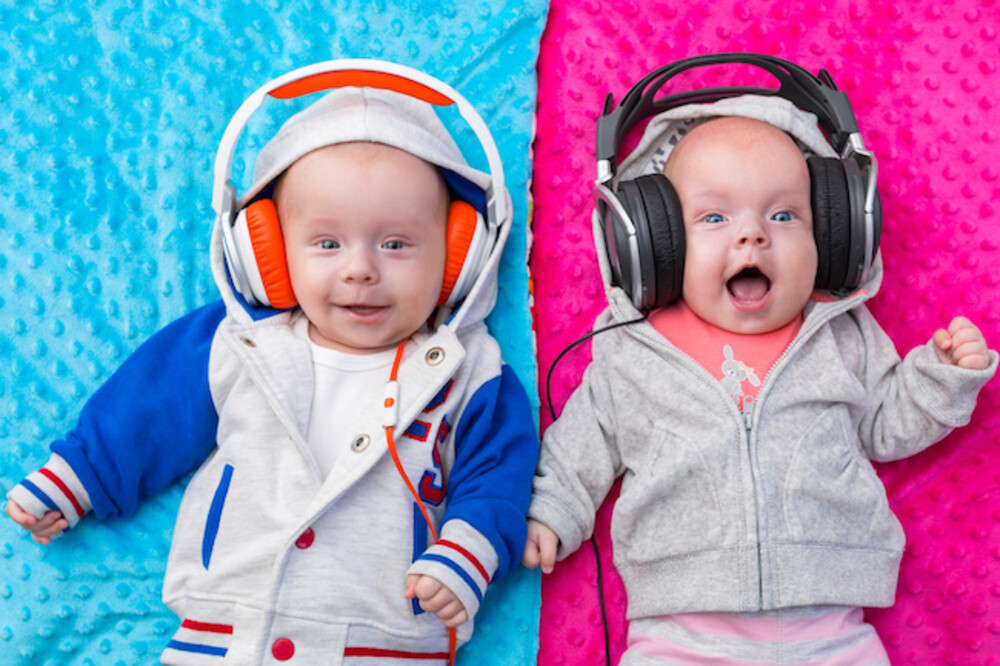
The “Mozart Effect” is a widely held belief that playing music by the late Austrian composer for your unborn child can increase his or her intelligence.
In reality, the belief stems from a 1993 paper in Nature by psychologist Frances Rauscher. In her study, Rauscher found that college students that listened to 10 minutes of Mozart before a series of tests gained up to 8 spatial IQ points. Over the next decade, the study was twisted and commercialized until it became the “effect” discussed today, applying to all classical music and all young children.
While the link between Mozart and smart babies has yet to be proven, that hasn’t stopped researchers from studying the effects of music on a newborn’s brain development. So far the results have been promising, and various studies, discussed below, have demonstrated other benefits to playing music for your child.
The Benefits of Playing Music to Your Child
Music and parent interaction can help babies understand language
A study by the University of Washington’s Institute for Learning & Brain Sciences (I-LABS) found that playing music to 9-month old babies led to an improved understanding of rhythm in speech and music.
The study followed 20 babies as they were played children’s music while they engaged in some rhythm exercises with their parents. Another set of 19 babies were given toys to play with, but were not played music. After a week, the babies were brain scanned while the music was played, only this time the song was occasionally interrupted to observe the effects on the brain. The babies in the “music group” showed greater responses to disruptions in music and speech.
“Our study is the first to demonstrate that a type of enriched experience with sound other than language can influence infants’ speech sound processing,” lead researcher Christina Zhao said.
Early music training can benefit children before they can walk and talk
Similar to the previous study, researchers from McMaster University studied the effects of music on young children as supplemented by parental interaction. The researchers studied two classes of one-year olds: an “interactive” music group, where the children learn percussion instruments and lullabies with their parents, and a “passive” music group, where the children played with toys while “Baby Einstein” played in the background. They found that the children participating in interactive music classes “smile more, communicate better and show earlier and more sophisticated brain responses to music.”
“Babies who participated in the interactive music classes with their parents showed earlier sensitivity to the pitch structure in music,” says Laurel Trainor, director of the McMaster Institute for Music and the Mind. “Specifically, they preferred to listen to a version of a piano piece that stayed in key, versus a version that included out-of-key notes.”
Interestingly, the same could not be said for the passive music group. “Infants who participated in the passive listening classes did not show the same preferences. Even their brains responded to music differently. Infants from the interactive music classes showed larger and/or earlier brain responses to musical tones.”
Lullabies and other music therapy can help premature development
A study titled The Effects of Music Therapy on Vital Signs, Feeding, and Sleep in Premature Infants recently found positive effects to singing lullabies and playing simulated womb sounds. These findings were improved blood oxygen levels, sucking behavior, and decreased stress as perceived by the parents.
272 babies from 11 different Neonatal Intensive Care Units (NICU) were monitored by music therapists for 32 weeks. Womb sounds were simulated using a variety of instruments to produce “whoosh” audio cues that were synchronized with the baby’s vital signs. Each baby was either small for their age or had a particular health condition.
“Many NICUs are noisy, or people put on random lullabies that are recorded,” said study author Joanne Loewy, director of Beth Israel’s Louis Armstrong Center for Music & Medicine. “What we’re saying is, it’s not just any old lullaby that’s recorded, it’s the power of the parent’s voice synchronized therapeutically…and the other two sounds that can have a therapeutic benefit.”
It may be a while before we find conclusive evidence on the benefits of music on infants, but the existing research shows that your children have more to benefit from listening to music than from not. Dr. Diane Bales, Associate Professor and Extension Human Development Specialist at the University of Georgia argues that music doesn’t necessarily make children smarter, but it does prime the brain for certain thought processes.
“Researchers think the complexity of classical music is what primes the brain to solve spatial problems more quickly,” she says. “This doesn’t mean that other types of music aren’t good. Listening to any kind of music helps build music-related pathways in the brain. And music can have positive effects on our moods that may make learning easier.”
In the meantime, raising your child in a creative, musical environment can still help them become more well-rounded person as they learn and grow.
For more pregnancy tips and guides, check out our post Five Things Nobody Told You About Being Pregnant.
To learn more about how you can be a surrogate, or how surrogacy can help you start your own family, visit ConceiveAbilities today.